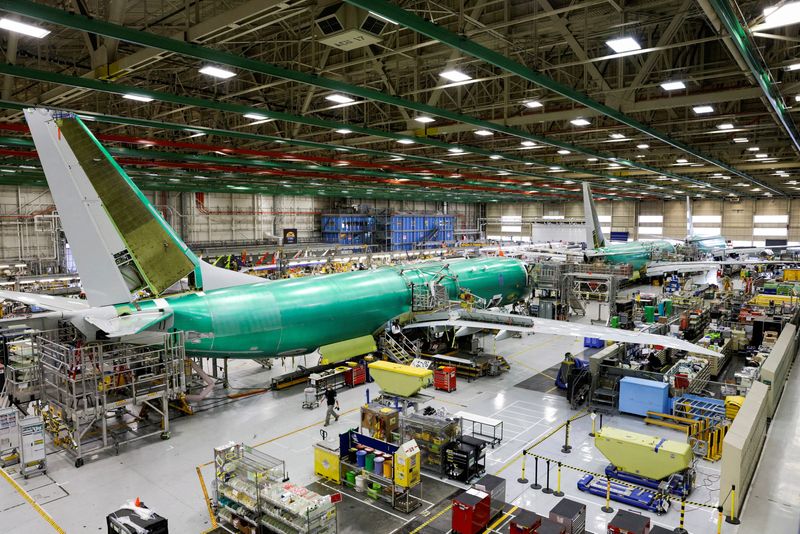By Tim Hepher and Valerie Insinna
(Reuters) -Boeing Co said on Sunday it will have to do more work on about 50 undelivered 737 MAX airplanes, potentially delaying some near-term deliveries, after its supplier Spirit AeroSystems (NYSE:SPR) discovered two mis-drilled holes on some fuselages.
Boeing (NYSE:BA) confirmed the findings in response to a Reuters query after industry sources said an "edge margin", or spacing problem, had been found in holes drilled on a window frame on some jets.
Boeing, which has been under fire from regulators and airlines since the Jan. 5 blowout of a door plug on a 737 MAX 9, said safety was unaffected and existing 737s could keep flying.
"This past Thursday, a supplier notified us of a non-conformance in some 737 fuselages. I want to thank an employee at the supplier who flagged to his manager that two holes may not have been drilled exactly to our requirements," Boeing Commercial Airplanes CEO Stan Deal said in a letter to staff referring to Spirit, which is the sole 737 fuselage supplier.
"While this potential condition is not an immediate flight safety issue and all 737s can continue operating safely, we currently believe we will have to perform rework on about 50 undelivered airplanes," Deal said in the letter, first reported exclusively by Reuters.
Spirit spokesperson Joe Buccino told Reuters that as part of its 360-degree quality management program, a member of its team identified an issue that did not conform to engineering standards.
"We are in close communication with Boeing on this matter," he said.
Deal said Boeing plans to devote several "factory days" this week at the Renton 737 plant outside Seattle to work on the mis-aligned holes and finish off other outstanding work. Such days allow teams to pause normal work and attend to specific tasks without shutting production.
The amount of rework time is expected to be finalised in coming days.
It is the latest effort by Boeing to tighten its operations after the blowout on an Alaska Airlines jet threw the spotlight on quality controls.
Investigators, who have been examining whether the bolts on the Alaska Airlines door plug were missing or badly fitted, are expected to issue an interim report this week.
At the same time, Boeing has asked a major supplier, which it did not identify, to halt shipments until jobs have been completed to specification, Deal said.
"While this delay in shipment will affect our production schedule, it will improve overall quality and stability."
Boeing said parts that already conform to the right specification can continue to be shipped.
The Federal Aviation Administration (FAA) had no immediate comment.
QUALITY DEFECT
The U.S. regulator has ordered Boeing to cap 737 production at the current rate of 38 jets a month for an undefined period while it addresses quality lapses, deferring the increases in production needed to meet rising demand for new jets.
So far, Boeing has said it will keep buying parts from suppliers at previously planned higher rates in order to cushion the impact they face from the freeze in production growth.
The 737 MAX checks focus on potentially sloppy positioning of two holes on a window frame assembly supplied by Spirit, a condition known as "short edge margin," the industry sources said.
Edge margins, or the gap between a fastener and the edge of a metal sheet, have to meet strict specifications designed to minimise the risk of metal fatigue over the long term.
In the past, the FAA has occasionally ordered inspections for cracks resulting from fastener holes being mis-drilled.
As of Friday, the "non-conformance" or quality defect had been found in 22 fuselages out of 47 inspected up to that point, spread between Boeing and Spirit, and may exist in some 737s in service, the sources said.
The findings came to light in a routine notification known as a Notice of Escapement, in which suppliers notify Boeing of any known or suspected quality slip, the sources said.
Such quality reports are common in aerospace but the discovery comes as Boeing and its best-selling jet are under the microscope following the Alaska Airlines emergency.
The U.S. planemaker last month urged suppliers to intensify checks and told them it is "imperative" that they meet quality requirements, according to a memo seen by Reuters.
People familiar with the matter said Boeing and Spirit have yet to come with an agreed position on how many of the mis-drilled holes have to be addressed, and how many of the errors are so slight that the fuselages can be used "as is".

Spirit, spun off from Boeing in 2005, is due to unveil earnings on Tuesday.
Boeing 737s are assembled in Renton outside Seattle from fuselages shipped by train from Sprit in Wichita, Kansas.